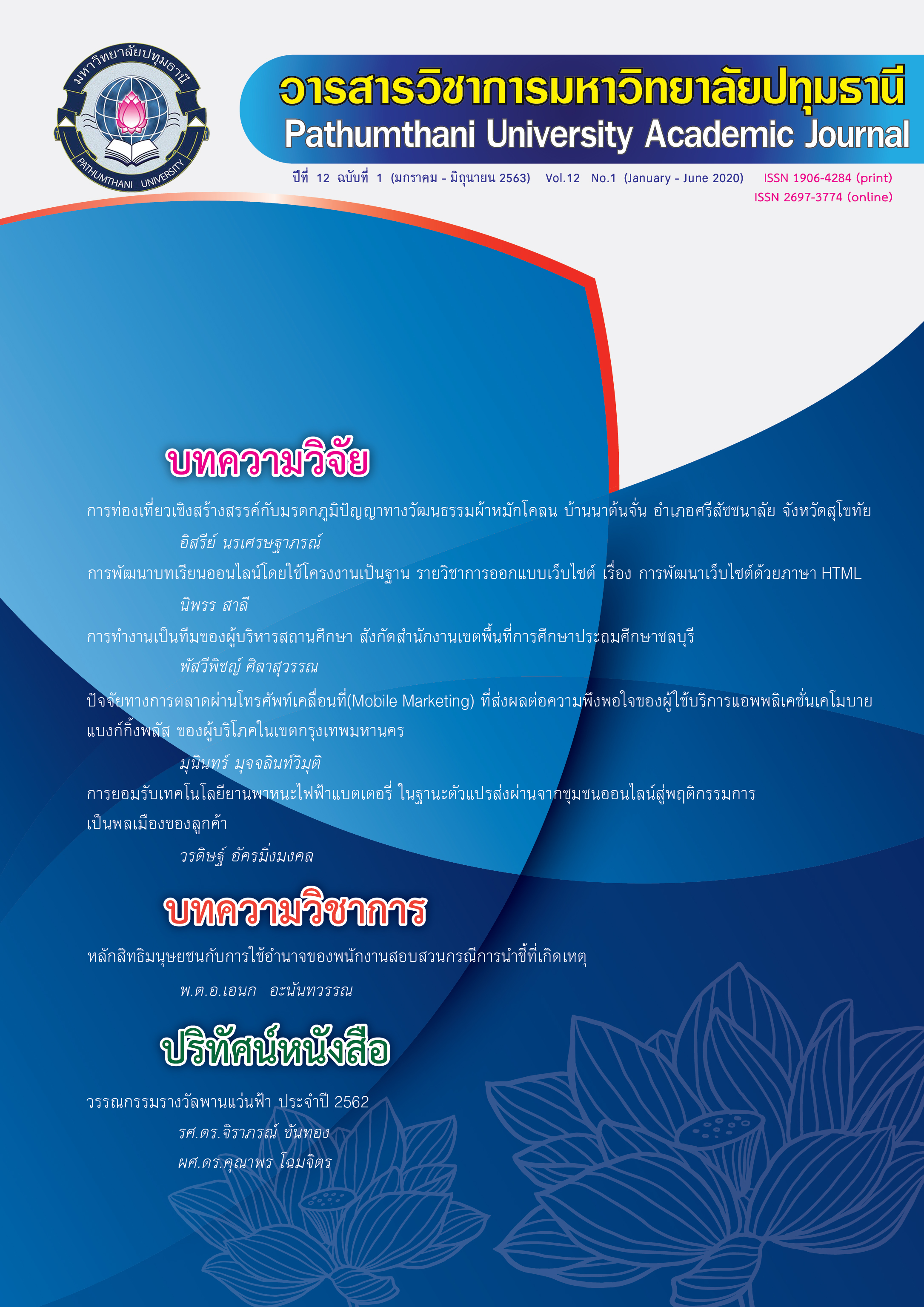Technology Acceptance of Battery Electric Vehicle as Mediator from Online Community to Customer Citizenship Behavior
Keywords:
online community, unified theory of acceptance and use of technology, customer citizenship behavior, battery electric vehicleAbstract
The purpose of this study was to investigate the customer citizenship behavior (CCB) from online communities by unified theory of acceptance and use of technology (UTAUT) as a mediator both of direct and indirect effects in battery electric vehicle industry. An online survey study with 400 respondents from online community members. Statistics used for data analysis were Frequency, percentage, average, standard deviation and structural equation model analysis.
The results showed that the most consumers were males, aged 24-40 years, single-level, bachelor degree, entrepreneur, earning less than 30,000 baths per month. The hypothesis testing showed that online community has effect on the UTAUT and only the in-role behavior from CCB. UTAUT has a mediating role in converting the effects of enhanced relationships in online community to CCB and types of value were significant statistical confidence level of 0.05
References
Bagozzi P. Richard amd Dholakia M. Utpal. 2002. Intentional social action in virtual communities. Journal of Interactive Marketing 16 (2) 2-21.
DeLone H. William and McLean R. Ephraim. 1992. Information systems success: The quest for the dependent variable. Information Systems Research 3 60-95.
Groth Markus. 2005. Customers as good soldiers: examining citizenship behaviors in internet service Deliveries. Journal of Management 31 (1) 7-27.
Gruen Thomas. 1995. The outcome set of relationship marketing in consumer markets. International Business Review 4 (4) 447-469.
Hennig-Thurau Thorsten, Gwinner P. Kevin, Walsh Gianfranco, Gremler D. Dwayne. 2004. Electronic word-of-mouth via consumer-opinion platforms: What motivates consumers to articulate themselves on the Internet?. Journal of Interactive Marketing 18 (1) 38-52.
Hsu Li-Chun. 2017. Investigating community members’ purchase intention on Facebook fan page: From a dualistic perspective of trust relationships. Industrial Management and Data System 117 766-800.
Islam Jamid and Rahman Zillur. 2016. Examining the effects of brand love and brand image on customer engagement: An empirical study of fashion apparel brands. Journal of Global Fashion Marketing, 7:1, 45-59
Laroche Michel, Habibi Reza Mohammad, Richard Marie-Odile. 2013. To be or not to be in social media: How brand loyalty is affected by social media? International Journal of Information Management 33 76-82.
McAlexander H. James, Schouten W. John and Koenig F. Harold. 2002. Building Brand Community. Journal of Consumer Research 27 412-431.
Okazaki S. 2007. Mobile marketing referral among the Japanese youth: does viral marketing work? 36th EMAC Conference, 22-25 May 2007. Reykjavik.
Rheingold Howard. 2001. The Virtual Community: Introduction The virtual community: Homesteading on the electronic frontier. W New York, NY: HarperPerennial
Smith, C., Organ, D.W., Near, J.P. 1983. Organizational citizenship behavior: Its nature and antecedents Journal of Applied Psychology 68 (4) 653-663.
Tsai Ming-Tien, Cheng Nai-Chang, Chen Kun-Shiang. 2011. “Understanding online group buying intention: the roles of sense of virtual community and technology acceptance factors” Total Quality Management 22 (10): 1091-1104.
Venkatesh Viswanath, Morris G. Michael, and Davis B. Gordon. 2003. “User acceptance of information technology: Toward a unified view.” MIS Quarterly 27 (3): 425-478.
Venkatesh Viswanath, Thong Y.L. James, and Xu Xin. 2012. Consumer acceptance and use of information technology: extending the unified theory of acceptance and use of technology MIS Quarterly 36 (1) 157-178.
Wang Hua, Fulk Janet, Mclaughlin Margaret. 2011. “Understanding Online Community Participation: A Technology Acceptance Perspective” Commnuication Research 39 (6) 781-801.
Downloads
Published
How to Cite
Issue
Section
License
บทความที่ได้รับการตีพิมพ์เป็นลิขสิทธิ์ของวารสารมหาวิทยาลัยปทุมธานี
ข้อความที่ปรากฎในบทความแต่ละเรื่อง เป็นความคิดเห็นส่วนตัวของผู้เขียน กองบรรณาธิการไม่จำเป็นต้องเห็นด้วยเสมอไป และไม่มีส่วนรับผิดชอบใด ๆ ถือเป็นความรับผิดชอบของผู้เขียนแต่เพียงผู้เดียว



